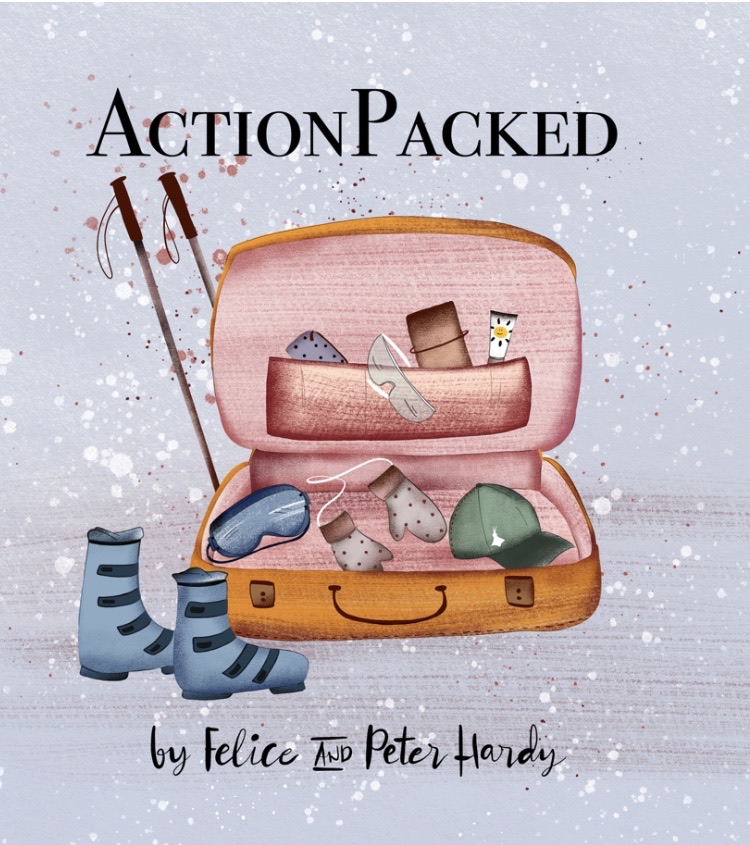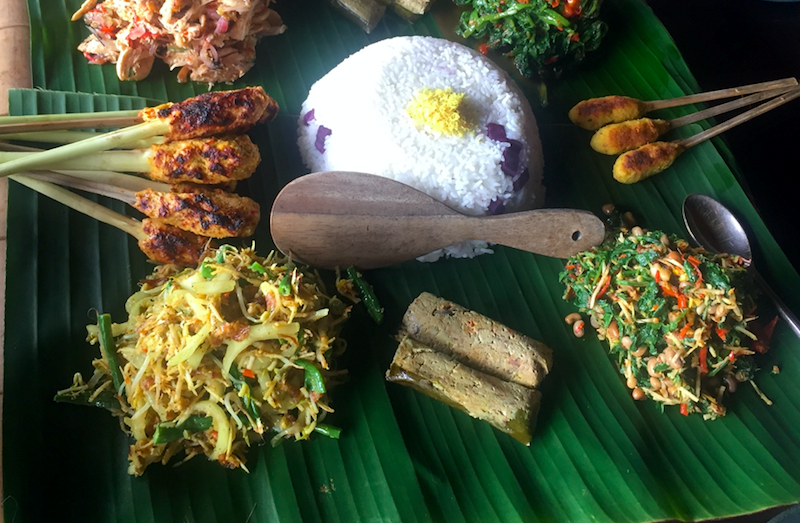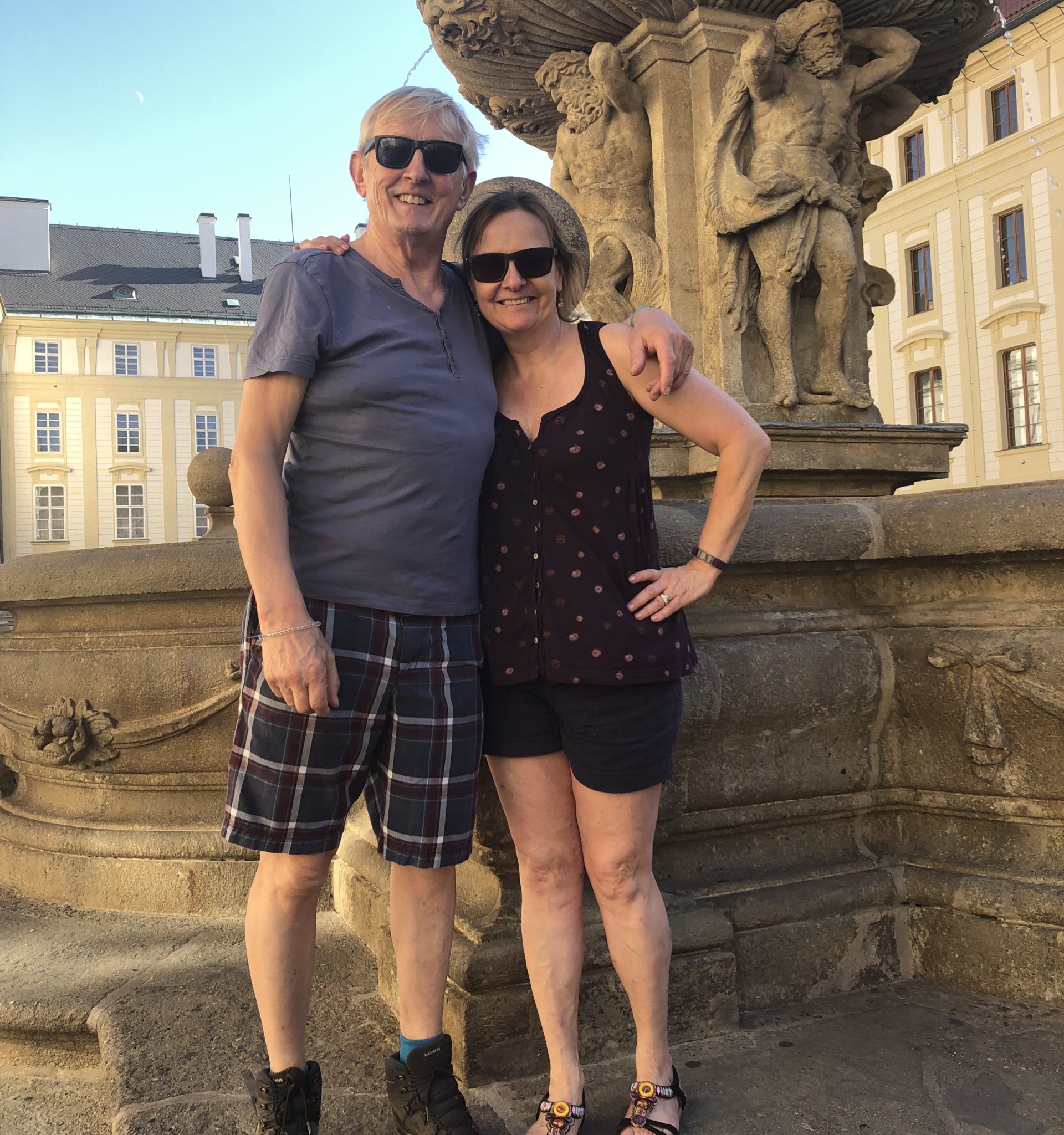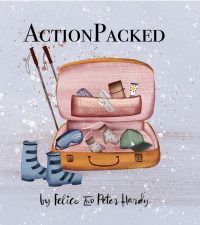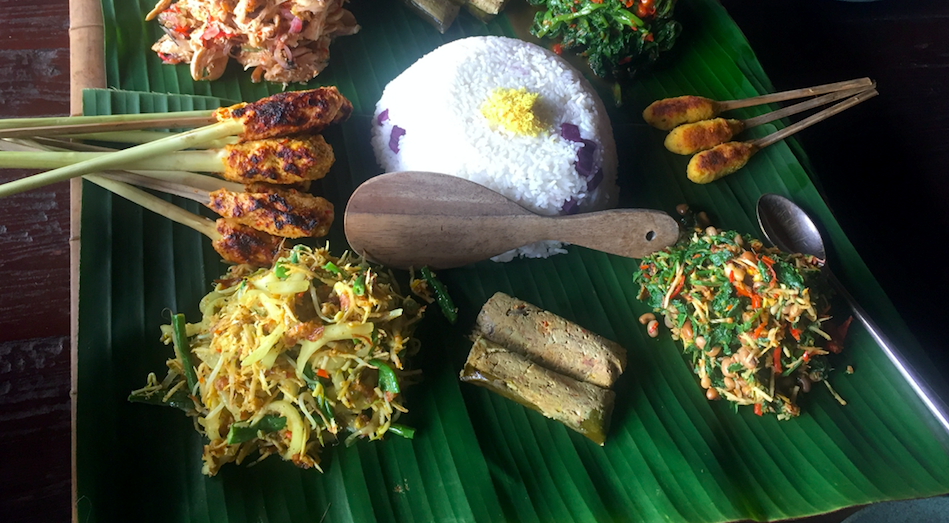
Balinese food
Peter Welcome to our travel podcast with specialist travel writers. And we’ve spent half a lifetime exploring every corner of the world.
Felice So we want to share with you some of our extraordinary experiences and the amazing people we’ve met along the way.
This week, we’re talking to award-winning travel and food writer Sarah Barrell. Sarah is Associate Editor of National Geographic Traveller. Her reports on her travels around the world have appeared in just about every publication in the UK. So can you tell us, Sarah, what started this passion for travel?
Sarah Well, I was born in South London, so a pretty working class family and I didn’t travel anywhere at all until I was about 14 – school ski trip, that kind of thing. So I think we worked out that my family date back something like 500 years. We’ve not moved out of South London and South of England in that time. So I feel like the universe owed me a bit of travelling. I think by the time I got to any kind of volition, I could make my own money, make my own decisions, I was gone. So that was me really, itching to leave South London the minute I could. Nothing wrong with South London, of course.
Peter Nothing wrong with South London but it nice to get out of it.
Felice Did you did you travel at all when you were growing up or was it just the one ski trip?
Sarah No, not at all. We went I’m one of four children, my dad’s a fireman, my mum was a working secretary, but really a stay-home mum raising four children. So there wasn’t a great deal of opportunity to travel, really. We did caravan holidays and things like that. And my parents were brilliant at making things fun. So Cornwall, Devon, tree climbing, lots of great stuff. But there was a kind of deep sense within me that there was more to life than that part of the country.
I studied languages at school. I just had a sort of appetite. So no, I didn’t travel at all, really, apart from a school ski trip and a French exchange, which was mind-blowingly exotic at the time. I went and stayed with a girl in Paris and I just thought it was the most incredible, glamorous family. I felt hugely intimidated, but it was a real mind-expanding thing.
And then when my mum went back to work, there was obviously a little bit more money to go around. And we went on a package holiday to Tunisia, which is back in the day when that was just beginning to be a thing. And that really sowed the seeds for me, realising that I just wanted to keep going. It was such a huge culture shock.
And I managed to befriend a local girl that worked in this all-inclusive package resort thing on the beach. So she would take me to her house and we’d have tea on the roof sitting on blankets. And it was such a universe perspective shifting thing for me. Smell of jasmine, orange blossom, all that stuff still makes me slightly giddy. So I think from that point onwards, really, any spare money I had, any little jobs I had – bar work, restaurants, of which there became many – I used it to to travel.
‘I disappeared for a couple of years.’
Felice So when was your first job in travel or travel writing?
Sarah Well, I worked for the university magazine and they didn’t really do any travelling or travel writing at that time. And I made it my job to write about wherever I’d been; not paid, obviously. I worked for a radio station, again doing bits and bobs, and then just kept travelling and going away and any money I earned…coming back, going away again. I think in the end an editor said to me at the radio station: ‘Sarah I think you just need to go, like permanently go, stop pretending that you want to try and make a go of things.’
So then I did the classic thing, disappeared for a couple of years. When I got back, I was really ready to go to work. So I did some work experience; I was very lucky and got some work experience at the Independent on Sunday when they were just launching their standalone travel section for the Sunday paper. And that was it really. I hung around there like a bad smell and made a pest of myself and got lucky and was determined and all the rest of it. So that was my first proper paid gig and it went from there. So I’m incredibly lucky really, that it was a perfect kind of aligning of stars for me to have landed at that point.
Felice And at one point, you lived between London and New York. How did you manage that?
Sarah Again, just with a bit of brute force and determination…and luck. So my now husband, then partner, had the opportunity to be transferred to Bloomberg in New York, the news agency. He was an editor there. He wasn’t so keen; he’s a Montrealer and he’d lived in New York so he was a bit ‘whatever.’ And me like Lady Macbeth, rubbing my hands behind him, thinking, ‘this is a fantastic opportunity.’
So he was working there and I would therefore be able to just come and go. And It was a brilliant platform then for not only exploring the States, but travelling around South America, because it’s much easier to get around…in and out flights…back in the day when I would spend six weeks doing one story and living off not much money and just really enjoying the ‘being there’ part of things.
Peter And is that the sort of time when food became a part of your life, food writing?
Sarah I wouldn’t necessarily say then, although Brazilian food really captivated me at that point, I think because it was so different, there were things I’d not encountered before. And I loved the marrying of Portuguese traditional food with something utterly different and exotic. So yes, I guess so. I think as with travel writing, the movement to food came by degrees of interest. So the more you become interested in something, the more you start writing about it.
So for example, the beginning of travel writing, I would write a lot about arts and culture and architecture because I was hugely interested in that stuff – still am, obviously. But I think the great thing about travel writing is it allows your mind to wander, it allows it to be anything you want it to be, you can make a story out of anything. And if you’re interested in something, I think it shines. If you have a passion for something, I think it comes through in writing. So I think the food interest snowballs – it’s a kind of chicken and egg thing, pardon the pun.
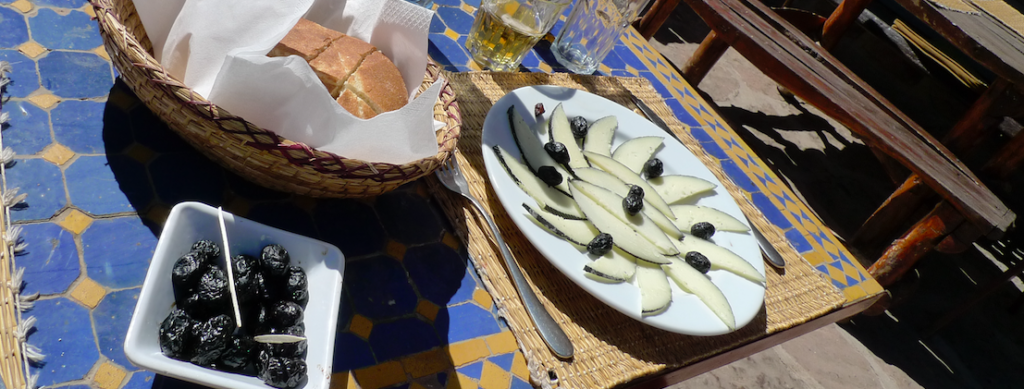
Peter Are you a big cook?
Sarah My husband’s Italian, so I was banned from the kitchen for years because, well, a self-banning because it was an insult to anyone around us to try and take the reins and push him out of the way. He’s a really good. His brother’s a chef, his aunts are incredible home cooks. He’s one of those brilliant, intuitive people that can look in a cupboard and just create a three-course meal.
So I didn’t cook for years, but I’ve always been really interested in watching what he does, and learning. And I think what it’s allowed me to do is explore stuff that he would never cook. So he’s very wedded to Mediterranean flavours and spices. His repertoire is limited in that sense. So anything that strays beyond that became therefore by default my territory. And it just so happens that the food I love, the things I like to cook, are often Asian Middle Eastern food. So I’ve become quite adventurous in that sense over the years.
Peter So this leads up to when you decide to write your book From The Source. Can you tell us about that?
Sarah Yes. So for a really long time I thought about doing a cookbook, an Italian type travel book. I couldn’t quite figure out how. And I think what interested me is my husband’s family are originally from Basilicata, which is one of those parts of Italy that’s slightly isolated from the rest of the country. It’s got a very distinctive food culture. Further south you get an issue that’s often the case, particularly Sardinia, places like that for obvious reasons of geography.
And I loved the way that his family, who are all in Montreal now, preserve this food culture in aspic – as happens with first- or second-generation immigrants. And it was just the most incredible way of tracing food history through dishes that they would do that you perhaps wouldn’t find in Italy itself anymore. Quite simple, it was a real cucina povera peasant food culture that my husband’s family come from. So I’d wanted to do a way of looking at that way of tracing dishes back to places. But I hadn’t really done it.
And then Lonely Planet came to me with an idea that was so similar and it was going to be the debut of a series, and asked me if I’d like to do the Italian one. So I absolutely jumped at the chance. So it was a kind of blueprint exercise, we were blazing a trail slightly and working out how that franchise would work. So it was quite a challenge, but it was such a brilliant opportunity to explore something that I’d been thinking about in a vague way for years.
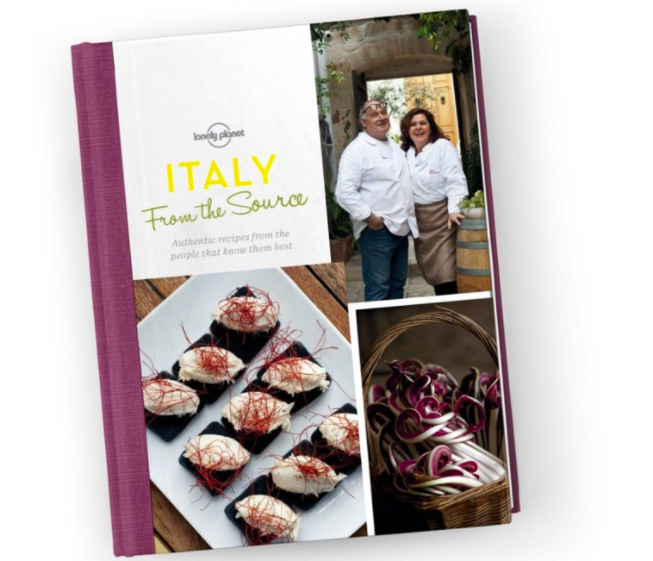
Peter So the book covers 60 different dishes?
Sarah Yes, 60 different dishes from different places. So the obvious one would be Bolognese from Bologna, ragout. Then you’ve got pizza a portafoglio from Napoli. But then there are loads of other ones you wouldn’t perhaps know about. Each different village in Italy has its own way of doing a particular pasta dish and the sauce. There’s so many ways of tracing that. And we were really determined not to do big name chefs, but you will find, for example, Massimo Botura in the book. But most of them, I’d say 90 percent, are just regular restaurant owners; often it’s a father-son, mother-daughter arrangement, a family restaurant.
So not fussy, something people can replicate at home. But what we really loved about it was how much the ingredients and the dish were wedded to the place they came from. So that the hazelnuts would have been sourced in the back country, and the wild boar comes from the forest, and the artichokes…etc. And Italy has got the most incredible rich story of food provenance. You could map food in such an intricate way in Italy, so that was the reason. And they’ve since gone on to do books on Spain and Thailand, but I do think Italy’s an exemplary formula, really, for that.
Felice So have you got any other books in mind that you might write?
Sarah Food books, not not particularly at the moment, although I’ve got an ongoing obsession with chocolate, not particularly because I like eating it, although I do, everyone does. But just because over the years I’ve travelled to places like Venezuela, Colombia, Ecuador, the Caribbean, where I’ve been lucky enough to meet small producer chocolate makers, and again there’s stories behind where these people have started their business from and the provenance of the cacao plants. It’s so interesting, but it’s one of those things that’s been done enough. So I’m sort of um-ing and ah-ing about how that might work as a story. For me always has to be wedded to place and people I think, not just about the food. So maybe that one’s what I’m pondering.
Felice Have you any favourite destinations for food apart from Italy, obviously?
Sarah Italy I think probably the places I love the most are where food is just incredibly distinct, where it’s almost been a kind of an isolated entity. So I love Thailand. And Japan I think probably is the place I’m most excited about at the moment. But also, I like places where there’s been a brilliant kind of fusion of food going on. So the Middle East would be a great example – Lebanon, Israel, I just love the sea from that part of the world. It just speaks about movement of culture. And you can’t pick up anything without having it informed by different peoples over history. It’s exciting food, I think.
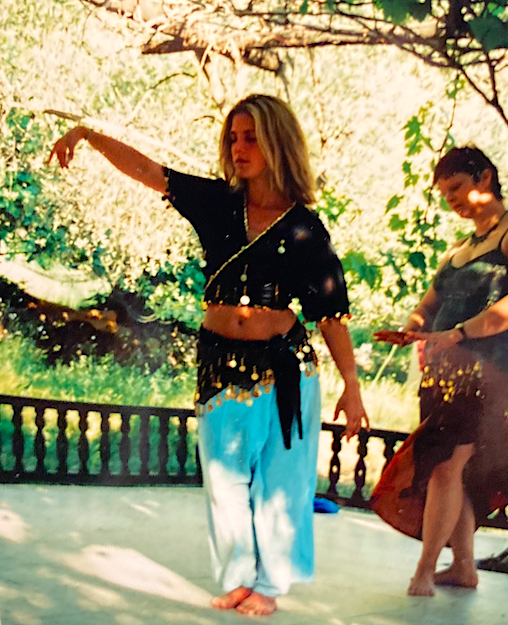
Learning to belly dance in Turkey
Felice Then apart from writing about food, you’ve had some interesting experiences. I read that you’d learn to belly dance in Turkey.
Sarah Yes, not very well. Going back to what I was saying about travel being brilliant, allowing you to follow your nose and follow any interest…so yes, everything from learning to to belly dance in Turkey. Not particularly well, as I said, it was on a kind of yoga retreat, but taught by a proper Turkish belly dancer, very much wedded to the idea of a wellness and centring yourself.
There was a real trend in the 90s of ‘have a go’ travel writing where you’d go off and do something mad, like jump off something or abseil or belly dance, which was brilliant fun back in my mid-20s, 30s, that was sort of a great fun thing to do. Now I think I’m almost more interested in spending longer somewhere and or perhaps returning to places. But the belly dancing was brilliant fun.
Felice And you went tracking snow leopards in Siberia, too. How was that?
Sarah That was an incredible opportunity.
Felice Is that something dangerous to do?
Sarah It didn’t feel that way because it was set up by a company who were really, really capable. Biosphere Expeditions are a charitable organisation that do voluntourism, citizen science type conservation trips run by a brilliant man called Mateus who’s former army. So the thing is set up so safely that you don’t feel that way. But we had Russian escorts with guns with us and things like that, so quite exciting.
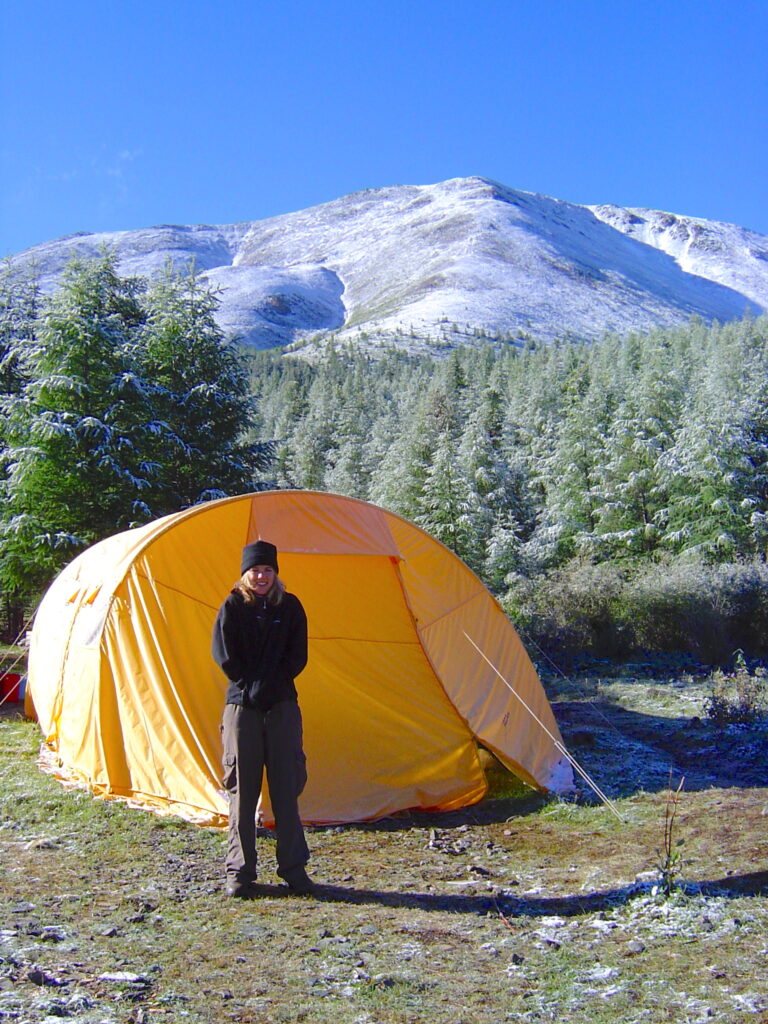
Sarah outside her frozen-over tent at the camp in the Altai mountains. The mornings are icy even in mid-summer
So I think probably the most dangerous thing would have been falling off a mountain in the Altai range in the Steppe towards Mongolia. They’re really high mountains with lots and lots of loose scree. So there was a hell of a lot of scrambling around trying to get up to the top of peaks to track things. We obviously come anywhere near a snow leopard, nor was it advertised as such. You’ve got to be really passionate about conservation for that particular trip. It’s not a kind of go and swim with the dolphins and stroke the leopards kind of deal. It’s walk around for two weeks and hope at best you can find some leopard scat that’s sort of fresh. That’s not something to get excited about.
But the setting – it was probably the most remote I’ve ever been, I think in two weeks, apart from the Russian army guys that were with us, we didn’t see another soul, apart from some Mongolian nomads that were in a yurt. So we clattered down in the Land Rover to have tea with them. And then the next day, the tent was gone, they were gone, no trace of them ever having been there, really. The setting was just some of the most humbling places I’ve ever been. And I’ve been to lots of places where there’s not much trace of human life. But this was, I’d say, the most incredible.
‘There were just sharks swirling underneath the floats of the plane.’
Peter Yes, I see you went to the Kimberley in northern Australia.
Sarah Again, the Australians are so laid back about doing something that’s pretty remote, gung-ho stuff. We landed in a floatplane in what had been a former sheep station, of sorts. And as we landed, touched down on the water, there were just sharks swirling underneath the floats of the plane and we were all a bit freaked out, but they just take it in their stride. And again, there’s plenty of anti-venom for snakes that we were tripping over in the bush. I mean, literally tripping over massive, great things. They’re equipped, but it’s all very low key, so it doesn’t necessarily feel scary while you’re there. And you are so blown away again by the setting, the remoteness, the colours, the extreme heat, the knowledge that people live out lives and make an existence in places that are brutal but beautiful, I find it fascinating.

Peter Yes, we spent a few days once on a cattle station in the Kimberley, which we flew into with a small plane. It was quite remarkable how remote it was. What perhaps struck me most was that the owner, the son of the owner guy, probably about 30. And every now and again, he had a total desire to go to a pub, and the nearest pub was a 12-and-a-half-hour drive away. And he’d drive a 12-and-a-half hours to the pub, he’d spent a couple of hours there and he’d drive back.
Sarah Yes, it’s impressive, isn’t it? And the children that travel six hours on a bus to go to school and six hours back again. Did you like the Kimberley? Was it a favourite? It really got to me, got under my skin, actually, the atmosphere of the place.
Felice We spent a whole month in Australia and I’ve got to say, it wasn’t our favourite place. We took our children, three children and we travelled in a motorhome for some of it. And we went to so many great places that Kimberley wasn’t as successful because the people weren’t expecting us when we got there with our three kids,
Peter Having been well organised by other people, it didn’t really work out.
Felice No one knew we were coming, so it was all slightly awkward.
Peter They found us a slight intrusion, I think, on their lives.
Sarah They don’t get that many passes by, do they? Families just dropping in. So where did grab your attention? Where did your kids like, for example in Oz?
Peter Well, I think they loved the Red Centre very much. And we went all over the place – we obviously did Cairns and the Barrier Reef and Sydney and everything, but they loved the Red Centre, I think probably most of all.
Felice Walking around Kings Canyon, they found that very exciting.
Peter So we tried to do too much in a month and you can’t do everything. It takes many years to do Australia.
Felice …and with quite young children as well.
Sarah You have to keep going back and chipping away at different bits of it and yes, with young children, those distances don’t really work. My daughter was born in America and we travelled on the East Coast, New York, and we travelled out west with her. And again, did that thing where it just too ambitious in the back of the car and you end up doing a tour of local municipal playgrounds out of desperation. She just can’t wait to get out of the car just at a random roadside playground, just for two hours, thinking ‘we’ve missed the sightseeing stop. Next.’
Peter Where’s your favourite place in the world?
Sarah That’s the horrible question, Peter!
Felice People always ask us that, too.
Sarah Yes, there’s no answer to that, is there. It’s like: ‘do you have a favourite child?’ Or a favourite song. My glib answer is ‘the place I’ve just been,’ but it’s sort of true. I think the travelling thing is a real itchy-footed kind of attention, somebody’s got to focus on things, I definitely feel like you need to be engaged continually. So it’s a bit like when you fall in love with someone each time you’re like, ‘oh, this is the one.’ There’s a little bit of that about it, although less so as I get older. As I was saying, I like returning to places now and that can just be more gratifying. See how it’s changed, how you’ve changed within that place. So, no, I really don’t have a favourite place. What would you do if I was to ask you that now, would you say?
Peter I wouldn’t come up with quite such a good answer as you have.
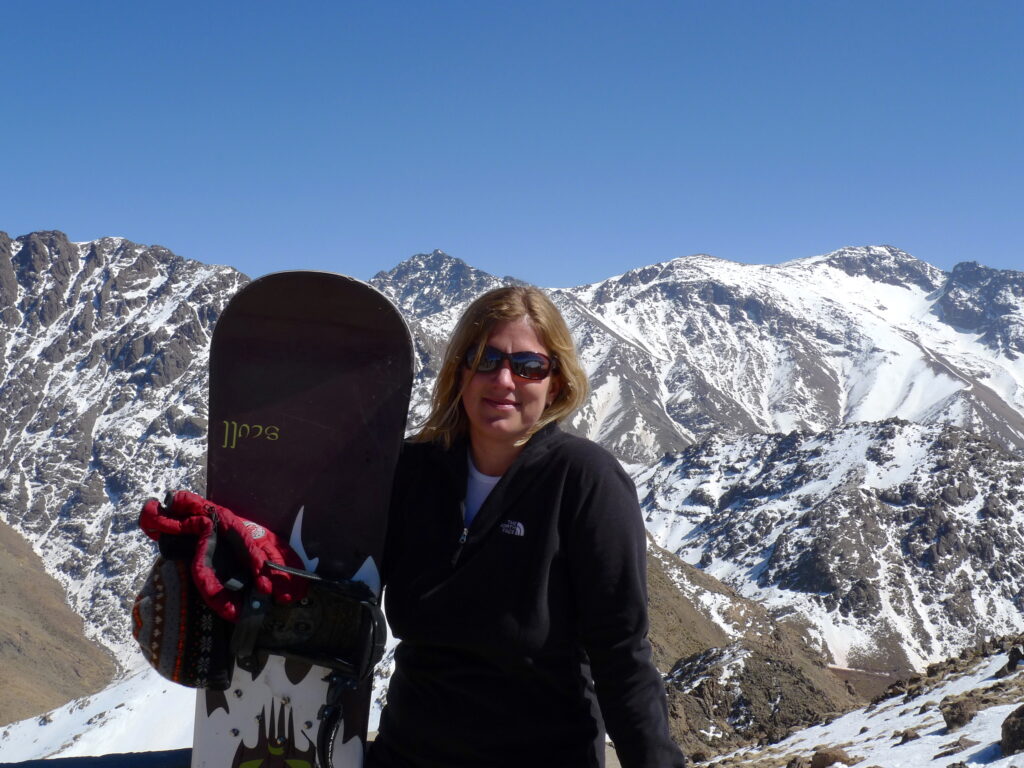
Sarah ready to snowboard
Felice People usually ask us, ‘what’s your favourite ski resort?’ because skiing is our speciality. And that’s, again, the same thing…impossible to answer.
SarahAnd it depends what you’re there for, doesn’t it? Like if you’re with your children, like if I ski with my daughter, I’d probably say one thing and if I’m skiing for myself, it would be a different one.
Peter Exactly. Because skiing in particular, ‘what’s the best ski resort in the world?’ Best for what? Best for food or best for off piste or what? So you really can’t sort of define it like that.
Sarah We skied in Wyoming recently, my daughter and I, and that was pretty amazing.
Peter Was that Jackson Hole?
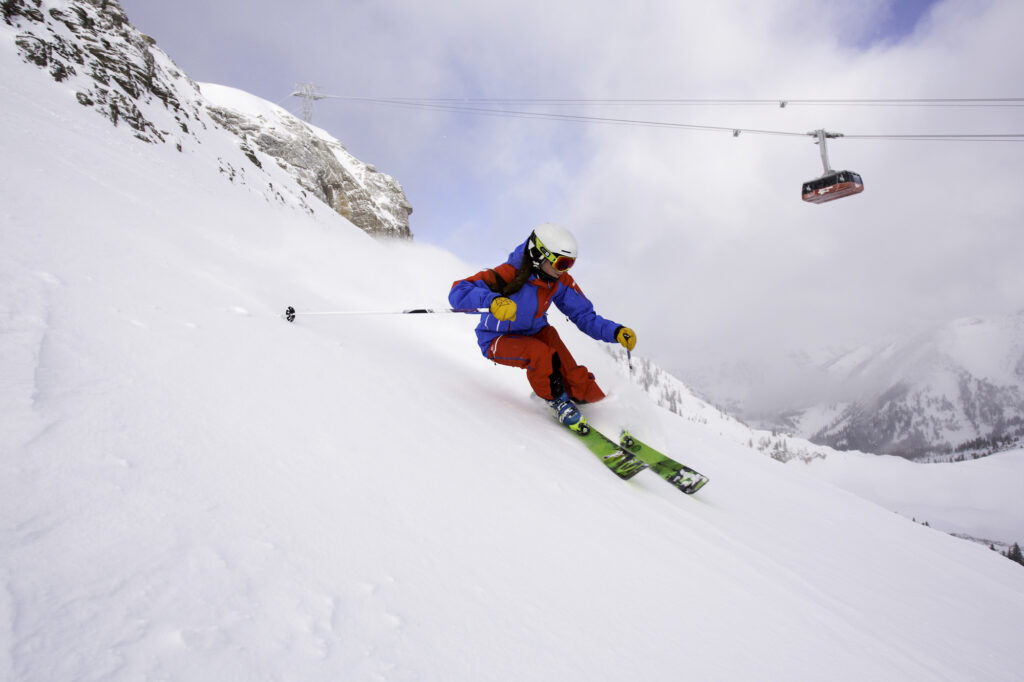
Photo: © Jackson Hole Mountain Resort
Sarah Yes. You’ve been, I’m assuming?
Peter Yes, the one question when people like to say, ‘What is your favourite ski resort?’ Both of us reply ‘It’s Jackson Hole.’ Yes, that’s our favourite ski resorts in the world, all-round, for everything.
Sarah It just ticks so many boxes, doesn’t it? Cowboy country, big American West, the buffalo, and then incredible skiing – as much as you want, as hard as you want, but really fantastic. That American thing of making everything super accessible, really easy, it’s all there for you facilities-wise. My daughter’s eyes nearly fell out of her head a few times just at the scale of the thing. She’d skied in Europe mostly before, so the idea that there’s this pretty formidable cowboy culture there. And I think she just couldn’t get her head around it. She thought it was the most brilliant thing she’d ever come across, and learn knife throwing one evening in some shop, you know, they let you.
Peter We’ve done that.
Sarah It sounds really gimmicky, but…
Peter We went there with our eldest son on his fourth birthday, which is a good place to start skiing. On the morning of his birthday, he got to ski school and they stuck a sticker on him saying: ‘Hi, I’m Max and I’m four years old today.’ He could not believe it, that everyone in the resort knew it was his birthday.
Sarah And I bet they made a really big deal of it as well.
Peter And he never looked back. He went on to be in the British ski team and is a fabulous skier, because of that wonderful beginning.
Felice Also, you skied in Morocco. It is something we’ve always wanted to do and never managed to do it.
Peter We got very close to it. A year or two ago, a friend of mine did have a heli-ski operation there, Hervé Favre, but he’s given it up. The year I was going to go, he stopped it and we never got there. But what was it like?
Sarah So that would be the way to do it, I’d say, heli-skiing. I was in Marrakech doing a story and it was right in the middle of winter. And I just thought, I’ve always wanted to do this, I’m just going to give it a quick go. So I just hung on a few days longer and took a car out to just outside Marrakesh, into the Atlas. So it was really a novelty, to be honest. The snow wasn’t good enough, it was melting, And it was one piste run down and I think there was one ski-lift up. It was absolutely brilliant fun. There were people on camels renting you the skis and the bindings. The skis and the bindings looked like they had staggered out of the 80s, all old school stuff. Yes, and they would fit the bindings on the side with screwdrivers and what have you, those all in one zip-up ‘80s suits, because I had no kit with me as well.
So I just spent a day really trying my best to have good fun. In the middle of that day, a helicopter, turned up with a load of French heli-skiers. I’m not a good enough skier but I was sorely tempted to blag my way on. Of course, no helicopter has a spare seat going. But again, even just the little bit I did…the the views were out of this world – white peaks and then desert, which I have to say it was quite hard-going, lumpy snow and it was really worth the kind of novelty for a couple of days.
Felice What was the food like there?
Sarah In the ski resort? We were in this weird, funny little hotel, not the most welcoming I would say. I think again, they didn’t quite know what to do with us. We weren’t really expected. It almost looked like they were probably ready to shut up for the season and then an annoying couple of people turned up. It was run by a sort of French-Moroccan couple. I think the lady was French, the guy was Moroccan. So it was sort of French bistro food, slightly incongruous. So we were having cheese and ham for breakfast and then tagine for dinner. It was all right but not the best Moroccan food, I have to say.
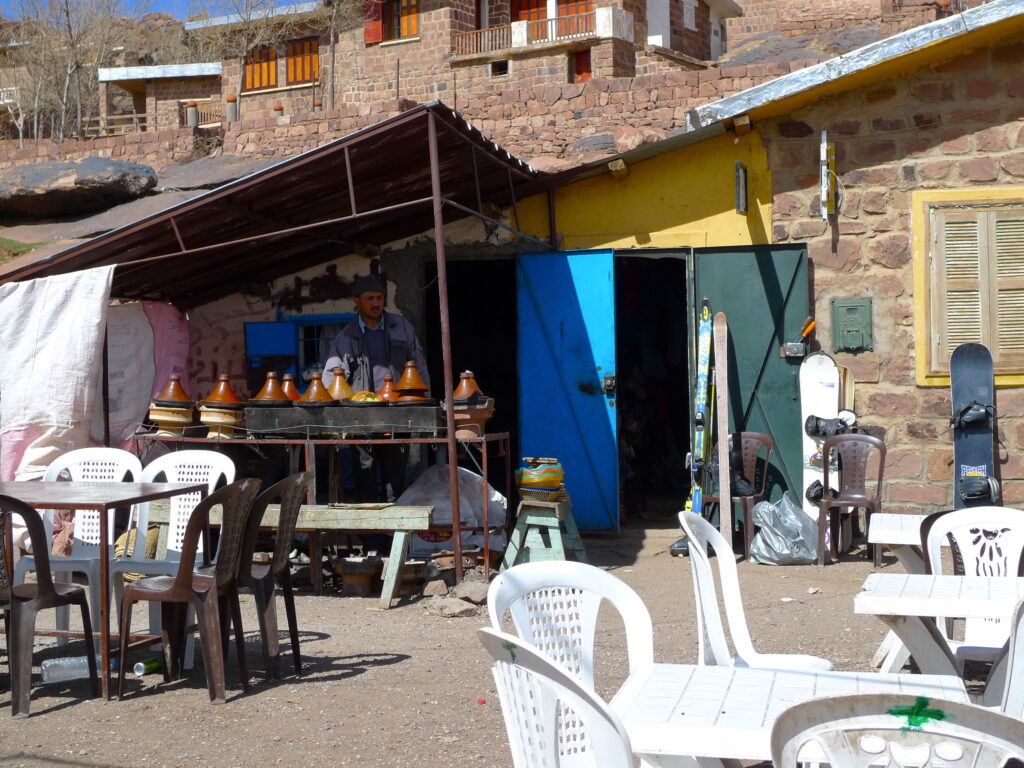
Tagine al fresco in Morocco
Felice So on all your travels, have you ever had anything go wrong?
Peter Disastrously wrong.
Felice You know, really wrong.
SarahYou know what I often think about how often it could have gone wrong. And I’d have to say, no, not really. I mean, I’ve had a couple of really bad illnesses where I’ve been completely laid out, just can’t move. One of those times is in the Brazilian outback and that was that was a bit scary. But people, for the most part, when stuff goes wrong, I’ve always just been so lucky to have local people really help out when I’ve lost things or become ill. I really believe that is generally the case. Of course, you can get mugged and get lost. But on the whole, I’ve been so lucky.
Once I couldn’t find a bed for the night, in the middle of Thailand, in the middle of nowhere. A family just took me in and I slept with their kids on the floor and then in the morning said goodbye, they wouldn’t take any money. Same happened in France before. I used to hitchhike a bit. Now I think about that and put my hands over my face and I think: ‘I would never advise my daughter to do that’. But I had brilliant experiences, nothing dreadful. The worst thing’s probably losing your notebook. And that’s happened.
Peter It’s happened to all of us.
Sarah It happened once in Ecuador. I put it on top of a telephone booth back in the day when there were no mobile phones and I was making some horribly sweaty, important telephone call when you’re shoving coins in and you’re not getting through…and probably trying to rebook a flight or something. And then walked away and left a notebook that I’d been travelling around South America with on top of it. It had just gone. That’s the only other time. And then once in Japan, I left a notebook and a women chased me for a good 20 minutes. She must have followed me up the high street and finally found out where I’d gone, to give me my notebook back.
Felice That’s amazing. I once left my notebook in the Colosseum in Rome. That’s the only time I’ve ever done that.
Sarah Did you get it back?
Felice No.
Sarah It’s sickening. It’s a real white peaky moment.
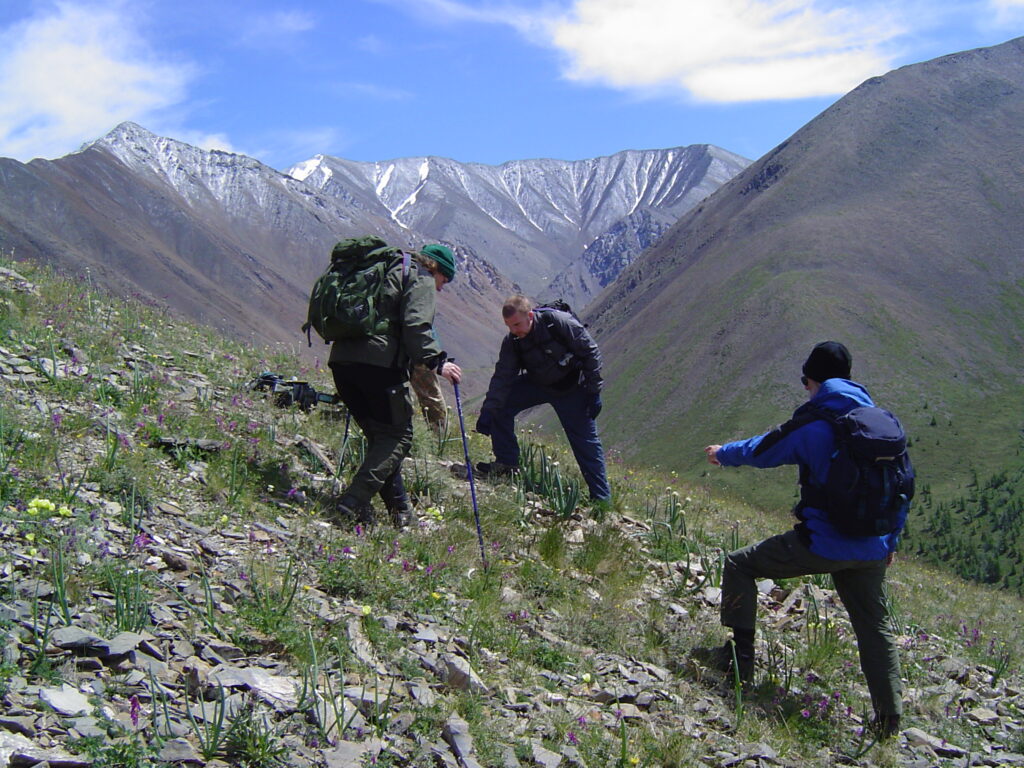
Looking for snow leopard scat
Felice But what do you see yourself doing in the next few years? Because obviously at the moment, there’s no travelling at all.
Sarah Yes, it’s a really peculiar time to be doing what we do, talking about travel, writing about travel and no one’s travelling. It’s begun to feel a bit surreal. But my main job is editing at National Geographic Traveller UK, and that’s still thriving. So I think that’s where I’ll be for the foreseeable. I’ve pretty much always had an editing job as a sort of holding thing and then freelance on the side. And at the moment, freelance work is not happening at all. So I’m very lucky to have this editing job and it’s a great magazine, It’s really doing quite well despite the circumstances. It is just simply doing really well. So we’re very lucky.
There’s been an enormous pent up need to travel
But I’m just hoping that within this next year, things will start to shift back to some sort of normality. There’s been an enormous pent up need to travel. People will be desperate to do it, desperate for people to give them recommendations, how to do it, etc. So I don’t feel like we’re at a dead end; it just feels very peculiar at the moment not leaving my postcode, barely leaving my kitchen, calling myself a travel writer. I think it’s the only year I haven’t really travelled since I was in my teens living at home with my family. How how have you found it?
Peter It’s the first time for me in such a long time, I won’t even tell you the figures. Since I was about four years old that I was stuck here. We’ve been here almost a year here now.
Felice Yes, me too. It’s the longest I have ever been without going to another country because I’ve always travelled all my life. So, yes, it’s a very odd feeling.
Sarah I’m surprised. I thought I’d have a horrible attack of claustrophobia. When my daughter was born, much as I absolutely love her more than anything in the world, obviously, that first year of having a small child nearly sent me bonkers. I was dreaming of airport departure boards flicking around like in seventies movies, you know, couldn’t wait to get going again. But actually, oddly, I haven’t found this so claustrophobic. But the dreaming of other places doesn’t stop.
Felice If people want to read what you’ve written or buy your book, where can they find out more?
Sarah So The Lonely Planet book is on the Lonely Planet website and it’s on any online stores. You know, Amazon, what have you. I’ve seen it in places like Waterstones. I don’t go looking for my book, but I have seen it.
Felice And what’s your website name?
SarahIt’s just my name. So SarahBarrell.com so you probably want to say ‘barrelle’, but we don’t in our family, that’s too pretentious. So we’re a barrel, not a barrelle.
Peter Thank you very much for appearing on our show. And we wish you the very best of luck with your future travels when they’re allowed to happen.
Sarah And to you.
Felice That’s all for now. If you’ve enjoyed the show, please share this episode with at least one other person! Do also subscribe on Spotify, i-Tunes or any of the many podcast providers – where you can give us a rating. You can subscribe on Spotify, Apple Podcasts or any of the many podcast platforms. You can also find us on Twitter, Facebook and Instagram. We’d love you to sign up for our regular emails to [email protected].
Also see our post, Sudi The Foodie.
© ActionPacked Travel

- Join over a hundred thousand podcasters already using Buzzsprout to get their message out to the world.
- Following the link lets Buzzsprout know we sent you, gets you a $20 Amazon gift card if you sign up for a paid plan, and helps support our show.
